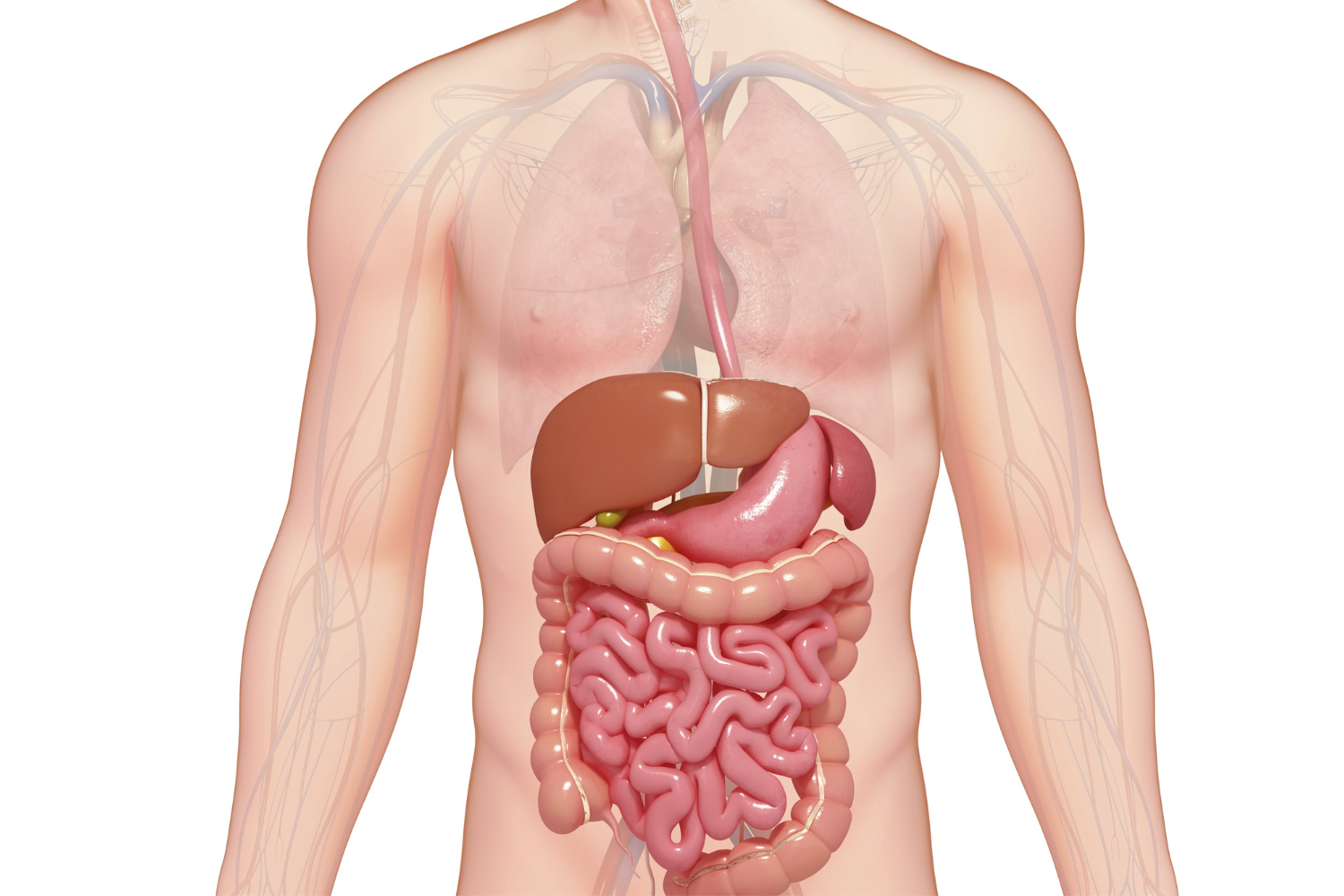Consumer interest in gut health and digestion has grown rapidly as more people recognize the link between the digestive system, immune system, and mental well-being. A healthy gut microbiome, made up of beneficial bacteria and other microorganisms, may influence digestion, inflammation, and communication between the gut and brain.
With rising awareness of poor gut health and its impact on overall health, digestive symptoms like bloating, constipation, stomach pain, and irritable bowel syndrome are prompting individuals to seek targeted solutions. This shift has made gut health supplements—especially those containing probiotic supplements, fiber-rich foods, and fermented foods—a high-demand category.
Nutrition brands have a strong opportunity to develop products that support a healthy gut, promote better bowel habits, and align with the growing focus on preventive health. This guide outlines how to create gut health and digestion supplements that meet these needs and position your brand for success in a competitive market.

Table of Contents
ToggleUnderstanding Gut Health & Digestion Supplements
Gut health and digestion supplements support the body’s digestive system and promote a healthy gut microbiome. These products are formulated to support digestive health and a balanced gut microbiome in the gastrointestinal tract. They may play a role in immune function and support overall well-being, as the gut sends signals to the brain and regulates inflammation and stress responses.
A healthy gut helps the body process nutrients, eliminate waste, and manage common digestive symptoms linked to poor gut health, such as constipation, stomach pain, and diarrhea. Supporting the gut means supporting the entire body, including the immune response, mental clarity, and overall health.

Common Use Cases
Gut health supplements are used in many situations to support both short-term and long-term health goals:
- Supporting digestive comfort and reducing bloating: May support digestive comfort in individuals with occasional digestive upset.
- Balancing gut flora for overall wellness: Maintains a healthy gut microbiome by increasing friendly bacteria and reducing harmful organisms.
- Addressing dietary sensitivities or improving regularity: Supports better bowel habits and helps the digestive tract process certain foods, especially in people sensitive to dairy products or fiber-rich foods.

Common Types of Gut Health & Digestion Supplements
Supplements for gut health and digestion come in different forms to meet various preferences and lifestyles. Each format helps deliver active ingredients like probiotics, enzymes, and fiber to support digestion, strengthen gut microbes, and improve symptoms such as constipation or stomach pain. Choosing the correct delivery method can improve user compliance and overall results, especially targeting specific digestive health conditions or age groups.
Popular Formats
- Capsules/Tablets: Convenient and shelf-stable, often used for probiotic supplements, digestive enzymes, or fiber blends that support the large intestine and small intestine.
- Powders: Easy to mix into drinks or smoothies; great for consumers focused on wellness routines and seeking support for gut bacteria and nutrient absorption.
- Gummies: A familiar and appealing option, especially for families and children, often containing good bacteria and fiber for a healthy gut.
- Liquid Drops: Offer precise dosing of probiotics or prebiotics; often used for people with difficulty swallowing pills or needing fast-acting digestive support.

Benefits of Offering Gut Health & Digestion Supplements
Adding gut health and digestion supplements to your product line creates new opportunities to meet consumer needs and strengthen brand value. These products are in demand and offer wide appeal.
Meeting Consumer Demand for Digestive Wellness
More people are looking for natural ways to manage digestive symptoms like bloating, constipation, and stomach pain. Instead of relying only on medication, they are turning to supplements to support the digestive system and improve overall health.
Gut health products attract wellness-minded shoppers and those managing irritable bowel syndrome, food sensitivities, or poor gut health. The broad demand creates opportunities for brands to reach different age groups and dietary lifestyles.
Expanding Product Offerings to Build Trust
Gut supplements work well alongside existing products that support the immune system or help manage stress. These categories are closely linked since a healthy gut can affect mood and immunity.
Bundling gut health formulas with weight management or energy products makes it easier for consumers to meet multiple health goals. This strategy also increases cart value and strengthens brand loyalty.
Enhancing Brand Reputation with Science-Backed Solutions
Using clinically studied strains of probiotics, prebiotics, and enzymes helps build credibility. These ingredients are supported by research and play an essential role in the gut microbiome and digestion.
Clear labeling with non-GMO, allergen-free, or vegan certifications adds to consumer trust. Clean-label products appeal to those focused on a healthy diet and long-term well-being.
Key Ingredients in Gut Health & Digestion Supplements
Choosing the right ingredients is key to developing effective gut health products. Each ingredient plays a role in improving digestion, balancing gut bacteria, and supporting the digestive tract.
Probiotics
Lactobacillus and Bifidobacterium strains help support a healthy gut microbiome and improve digestion. They also strengthen the immune system and support gut health, which may help with occasional digestive discomfort.
Saccharomyces boulardii is another helpful probiotic that has been studied for its potential to support gut function and manage occasional digestive upset, including diarrhea, especially during or after antibiotic use.
Prebiotics
Inulin is a type of natural fiber that feeds beneficial bacteria in the colon and large intestine. It helps maintain a healthy gut and supports better digestion.
Fructooligosaccharides (FOS) also nourish good bacteria and help promote regular bowel habits. They support a healthy gut environment and aid in growing friendly bacteria.
Digestive Enzymes
Protease, amylase, and lipase help break down protein, carbohydrates, and fats. These enzymes support the body in absorbing nutrients and easing digestive symptoms.
Lactase helps people digest dairy products by breaking down lactose, making it useful for those with food sensitivities or lactose intolerance.
Specialty Ingredients
Peppermint oil can ease bloating, cramping, and gas. It supports the digestive tract by helping relax the GI tract muscles.
Aloe vera is used in some supplements to support gut comfort and a healthy GI lining. It’s often used to support overall gut comfort and healing.

Steps for Nutrition Brands to Develop Gut Health & Digestion Supplements
Developing gut health supplements requires a clear strategy, from understanding your audience to selecting the right ingredients and launching the product effectively.
Conduct Market Research to Identify Consumer Needs
Start by identifying target groups, such as people with IBS, those who eat processed foods, or consumers seeking general gut and immune support. These groups often experience common digestive issues.
Look into rising trends, like synbiotics, which combine probiotics and prebiotics to support gut microbes. Tracking industry shifts helps guide product planning.
Source High-Quality, Clinically Proven Ingredients
Work with trusted suppliers that offer third-party-tested ingredients to ensure safety and performance. Look for probiotics and enzymes that have documented results.
Shelf-stable formulations are essential, especially for products like gummies or capsules. Consumers expect reliability and convenience in their supplements.
Create Thoughtful, Targeted Formulations
Blend ingredients that work together, such as combining prebiotics with probiotics to improve results. These combinations support gut bacteria balance and overall digestive health.
Focus on specific health conditions, such as formulas for active individuals, stress-related digestion, or support gut balance during times of dietary or lifestyle change, such as after antibiotic use. Tailored solutions increase value for the end user.
Design Packaging and Labels That Build Trust
Include detailed information about the number of probiotic CFUs and how much each ingredient is in a serving. Clarity helps consumers understand what they’re taking.
Use clear, truthful claims like “supports digestion” or “balances gut flora.” Avoid exaggerated language and stay aligned with labeling guidelines.
Market and Launch Effectively
Highlight how gut health affects many factors like mood, energy, and the immune system. Educating consumers strengthens your brand’s position in the digestive wellness space.
Offer samples or short-term trials to let people experience the benefits firsthand. This builds trust and can lead to stronger product reviews and long-term loyalty.

Marketing Strategies for Gut Health & Digestion Supplements
To stand out in a growing market, nutrition brands need a strong marketing plan that connects with informed consumers. Focus on trust, education, and ease of access.
Focus on Education to Build Consumer Trust
Consumers are more likely to buy gut health supplements when they understand how they work. Education helps build trust and sets your brand apart from others offering similar products. Clear information on the digestive system, gut microbiome, and common digestive problems helps your audience feel more confident about choosing your product.
Use these strategies to inform and engage your audience:
- Create content that explains the gut microbiome and how your product supports a healthy gut.
- Use blogs, social media, and short videos to highlight digestive symptoms and how supplements can help.
- Share research-based insights and customer stories to show real-world impact.
- In daily routines, educate on the benefits of probiotics, prebiotics, and digestive enzymes.
Partner with Experts and Influencers
Working with dietitians and wellness influencers can help expand your reach. These professionals understand gut health and digestion, making them ideal voices for your brand.
Testimonials and product reviews from trusted experts help reinforce the value of your supplements and increase consumer confidence in your brand.
Offer Value with Bundles and Subscriptions
Combining gut health supplements with immunity or stress-support products adds convenience and value. These pairings support overall health and attract customers looking for complete wellness solutions.
Subscription options and loyalty rewards encourage repeat purchases. These programs help build long-term relationships and steady revenue for your brand.
Why Gut Health Supplements Are a Smart Move for Nutrition Brands
The demand for gut health and digestion support continues to grow as consumers seek better ways to manage health conditions and improve well-being. Brands focusing on clean-label, research-backed ingredients can build lasting trust and capture attention in a competitive space. High-quality, effective formulations position your company to meet real needs and deliver value in the growing digestive health market.
Frequently Asked Questions
What certifications should gut health supplements have?
GMP certification, third-party testing, and allergen-free or vegan certifications as needed.
How long does it take to develop gut health supplements?
Typically 6–12 months, including formulation, testing, and regulatory approval.
What are the most popular ingredients in gut health supplements?
Probiotics (Lactobacillus, Bifidobacterium), prebiotics (inulin, FOS), and digestive enzymes.
Are probiotics better combined with prebiotics?
Yes, combining them as synbiotics enhances the efficacy of probiotics by providing food for beneficial bacteria.
Can gut health supplements help with bloating?
Yes, ingredients like peppermint oil, digestive enzymes, and specific probiotic strains may help with occasional bloating and support digestive comfort.
References
- Ianiro, G., Pecere, S., Giorgio, V., Gasbarrini, A., & Cammarota, G. (2016). Digestive Enzyme Supplementation in Gastrointestinal Diseases. Current drug metabolism, 17(2), 187–193. https://doi.org/10.2174/138920021702160114150137
- National Center for Complementary and Integrative Health. (2019). Probiotics: Usefulness and Safety. https://www.nccih.nih.gov/health/probiotics-usefulness-and-safety
- National Institutes of Health. (2023). In brief: How does the immune system work? https://www.ncbi.nlm.nih.gov/books/NBK279364/
- National Institutes of Health. (2017). Irritable Bowel Syndrome (IBS). https://www.niddk.nih.gov/health-information/digestive-diseases/irritable-bowel-syndrome
- National Institutes of Environmental Health Sciences. (2024). Microbiome. https://www.niehs.nih.gov/health/topics/science/microbiome
- Pandey, K. R., Naik, S. R., & Vakil, B. V. (2015). Probiotics, prebiotics and synbiotics- a review. Journal of food science and technology, 52(12), 7577–7587. https://doi.org/10.1007/s13197-015-1921-1
- U.S. Department of Health and Human Services. (2022). The Human Microbiome Project. https://irp.nih.gov/catalyst/21/6/the-human-microbiome-project
- U.S. Food and Drug Administration. (2025). Current Good Manufacturing Practice (CGMP) Regulations. https://www.fda.gov/drugs/pharmaceutical-quality-resources/current-good-manufacturing-practice-cgmp-regulations
- U.S. Food and Drug Administration. (2024). Food Allergies: What You Need to Know. https://www.fda.gov/food/buy-store-serve-safe-food/food-allergies-what-you-need-know
- U.S. Food and Drug Administration. (2025). Labeling & Nutrition Guidance Documents & Regulatory Information. https://www.fda.gov/food/guidance-documents-regulatory-information-topic-food-and-dietary-supplements/labeling-nutrition-guidance-documents-regulatory-information




